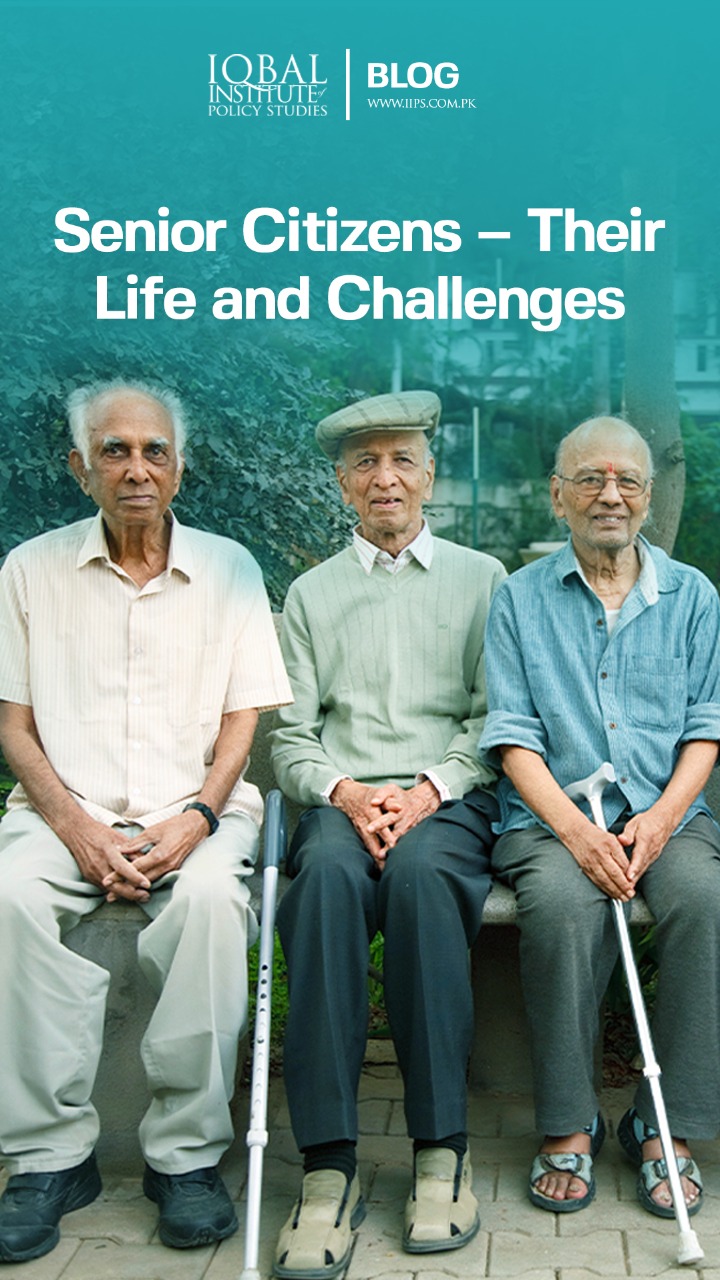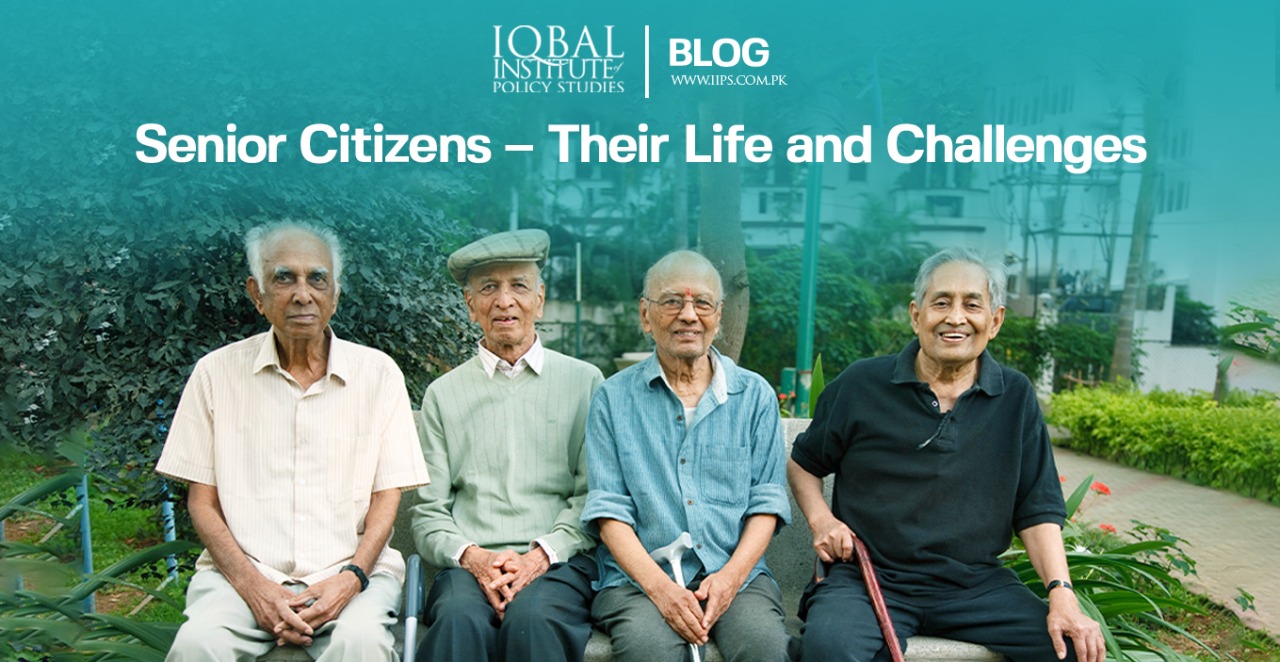
The words “Senior Citizen” sound so good that one feels privileged to be a senior citizen with a sense of exceptionality. This ‘feel good’ tendency fades away when most senior citizens in Pakistan brave through the challenges they encounter in their day-to-day lives. Those with firm and tangible support from their families are in a comfort zone and better off than those who do not have that backing. In my exposition that follows, I will bring forth a few facts about who are senior citizens and try to highlight their conditions, particularly in the urban areas. Those living in rural and far-flung areas usually enjoy care from their families compared to those living in cities and towns. Moreover, their needs are somewhat limited as their way of life is modest in many ways.

Who is a senior citizen? There is an obvious relationship between senior citizenship, old age, and retirement. One can be a senior citizen only after attaining a certain age. All around the world, old age is considered the last period in a person’s life. However, the categorisation of people as ‘old’ varies from country to country. Few interesting facts and aspects are given here.
-
According to World Health Organization (WHO), old age starts at 60 years and above. This categorisation is followed by most of the EU countries.
-
In the US, people aged 65 and older are considered part of the older population.
-
In Pakistan, old age is defined as 60 to 65 years or older. Interestingly, India has one of the lowest retirement ages in Asia – 58 years.
-
In Africa, old age is bracketed between 50 to 65 years. Only Libya is the odd country with a retirement age from 65 to 70 years.
-
World Economic Forum (WEF) defines old age differently. The prospective age is calculated on the average age in the country to determine the number of years people are left within their lives. According to WEF, if a person is 65, the prospective age is 15 years.
-
With an increase in life expectancy in most of the world, the definition and categorisation of old age has also changed. Approximately a decade ago in the UK, it was believed that old age started from 59 years, but now it is 70. Turkey has also enhanced the start of old age from 55 to 72.
-
In most developing countries, the start of old age is synonymous with the time one is eligible for pension welfare.
-
In China, there is a massive disparity between the retirement age of males and females. The former retires at the age of 60 while the latter at 50.

In my assessment, a senior citizen is a person who attains that age, where his abilities to perform physical or intellectual tasks, reduces and he needs varying degrees of assistance. In order to streamline the assistance meted out to elderly and senior people, some age bracketing is needed, and that has already been done around the world with this purpose in mind.
Coming on to the challenges faced by senior citizens, these are generally associated with their health issues, reduced physical abilities, and neglect by their family members. Issues arising from these factors are compounded by the sensitive nature of an elderly person, which is a natural propensity and varies from person to person. Here is a list of a few of the many challenges senior citizens face.
-
Hazy Sense of Purpose. With ageing and sidestepping from the mainstream community life, one tends to either lose a sense of purpose, or it blurs into haziness. This feeling of living aimlessly causes anxiety and other adverse psychological issues.
-
Reduced mobility. A senior citizen faces reduced mobility due to age and health-related issues. They surely need assistance and support to move along with their day to day work. This is the primary reason we find infrastructure at public places to facilitate senior citizens in many countries.
-
Psychological stress and sensitivities. Due to their reduced mobility, senior citizens cannot keep up with the routine activity of younger people in the family and thus feel left out. There is a feeling of being neglected and betrayed if the people around them tend to shy away and distance themselves. Senior citizens cannot accompany younger people for activities that require energy and vitality.
-
Financial Insecurity. Senior citizens generally suffer from financial insecurity unless they have the income to live comfortably. Whether from the public or private sector, retired people find themselves in a tight corner, and such people are many in our society.
-
Health Care Needs. There is an obvious need for increased health care with growing age, involving logistics and finances. A senior citizen needs to regularly go to the doctor, take medicines, and require a special diet. Inability to meet these needs puts that person under undue stress apart from deterioration in health.
-
Social Issues. Such issues are wide-ranging and can take their toll seriously on hapless senior citizens. Those who don’t keep their old friends and acquaintances find themselves isolated. They look for company, but there is no one there to give them adequate time as younger people have their own priorities. They see things happening around them but are seldom invited to be part of those. They are not all the time consulted for family and other matters.

It is the foremost responsibility of the state and society to take measures for ameliorating the challenges faced by senior citizens. In developed countries, senior citizens are well looked after through legislation and administrative measures. They are given preferential privileges at all public places to compensate for their reduced physical and mental abilities. We, in Pakistan, have not worked in this area, and there have been hardly any measures taken to facilitate the lives of senior citizens. Having said this, our society and its family values are a redeeming factor. We do not leave our ageing elders in old peoples home. Mostly, families tend to take good care of their parents and grandparents when they get older. We need to cling to these noble values to mitigate the problems of senior citizens. Our federal and provincial governments also need to generate concerted efforts to support the lives of senior citizens.


Leave a Reply